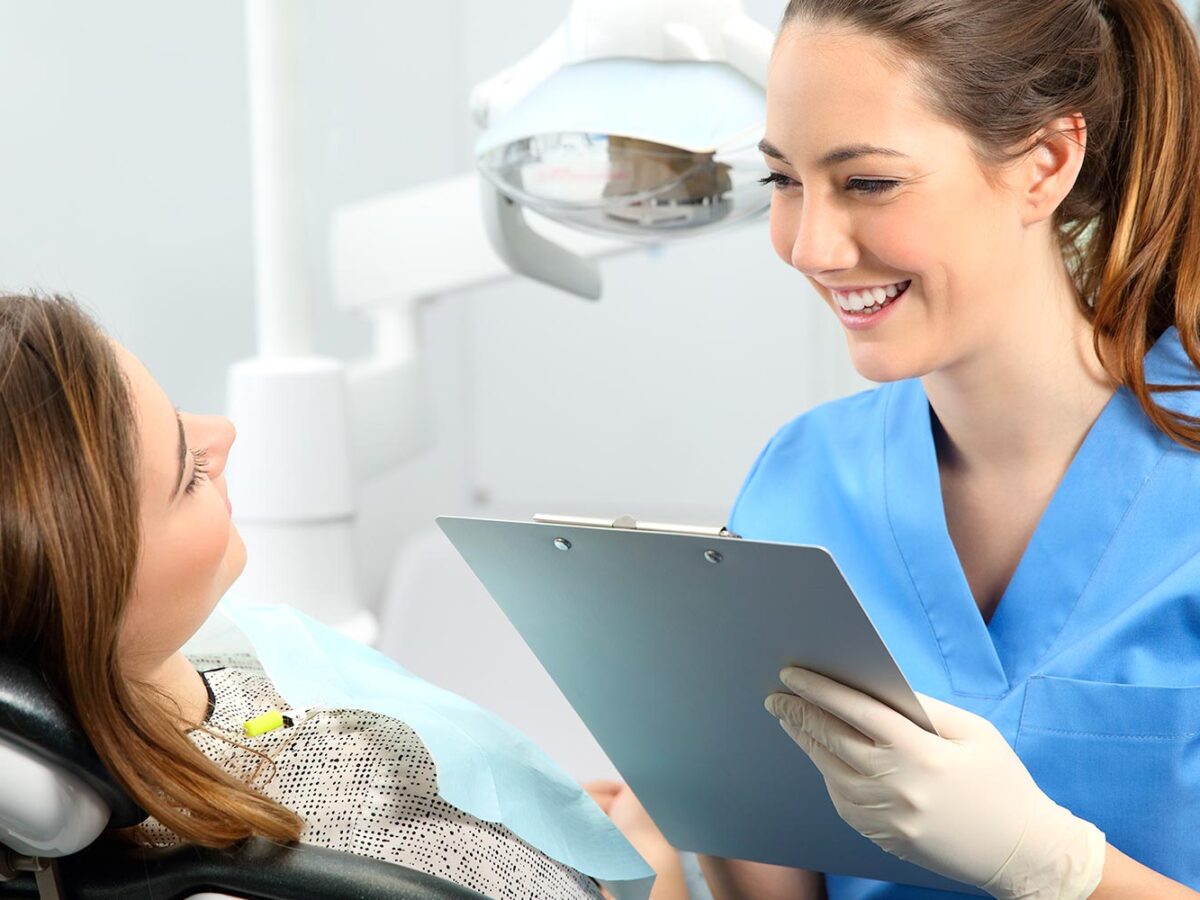A dental hygienist’s job is to maintain the health of the supporting structures of the teeth, such as the gum and bone that create the foundations for your teeth. This care includes prevention, diagnosis and non-surgical treatment of gingivitis or periodontal diseases commonly known as Gum Disease. These issues are often symptomless, but can present as bleeding when brushing, bad breath, swollen and red looking gums, loose teeth, or gum recession, and early detection of these concerns is vital in the prevention of gum and bone destruction so you may decide you need hygiene treatment yourself, or as a recommendation by your dentist.
What does a dental hygienist do?
Dental hygiene treatment
A Dental Hygiene Treatment may include scaling and polishing stains and deposits (such as plaque and calculus/tartar) off your tooth surfaces to treat these concerns, and if necessary can be done so using numbing gels or local anaesthetics.
Based on your specific needs your dental hygienist will suggest regular dental maintenance appointments to ensure stabilisation and prevention of further concerns, as well as comprehensive advice for ongoing home care.
Periodontal Disease is the later stages of gum disease. This is when the bacteria infection under the gums progresses deeper and affects the bone and tissue supporting the tooth. The main risk factors are smoking and bad oral hygiene.
Your gums will:
- Bleed when brushing or using inter-dental brushes.
- Will be red, swollen and tender.
- The gum will have pulled away from the tooth, this is called ‘Pocketing’.
- Pus may be seen in the pockets around the tooth.
- You may have bad breath also known as halitosis.
The infection damages the tissue that connects the gum to the roots of the tooth. Once the tissue has been destroyed the gum pulls away from the tooth, this forms a pocket which bacteria thrive in. If not treated, in time the bone anchoring the teeth in the jaw will dissolve, making the teeth loose and eventually the teeth will fall out.
Periodontal disease is irreversible, meaning once the damage is done it can not be repaired. The good news is you can slow down it’s progression by regular visits to the Dentist and Hygienist and by also improving your oral hygiene at home.
Gingivitis is caused by soft food deposits that contain sticky bacteria which are known as ‘plaque’. Plaque collects in the small gaps between the gums and the teeth and if not removed by regular cleaning will multiply by feeding on sugars found in your food and drink. This can lead to:
- Bleeding when brushing or flossing.
- Soreness or discomfort.
- Gums appear red in colour, puffy or swollen.
Bleeding when tooth brushing or using inter-dental brushes is the earliest and most common sign of gingivitis. Gingivitis is reversible if treated by a hygienist or by improved brushing and inter-dental techniques. However, if left untreated you will develop the later stages of gum disease, which is known as ‘Periodontal Disease’. Gingivitis thankfully is usually completely reversible and does not cause any permanent damage to the gums or teeth. Periodontal Disease however results in permanent damage that cannot be undone.
In order to keep your gums healthy you need to remove the daily build up of plaque from all the surfaces of your teeth by –
- Brushing your teeth twice a day, for two minutes each time. Ask your dentist which type of tooth brush is best for you, as many of us use brushes that are too hard or too large.
- USE INTER-DENTAL brushes as a toothbrush never reaches into the gaps between the teeth or below the gum line.
- Do not brush your teeth too hard as this can damage your gums, ask your dentist or hygienist to show you the correct technique.
- Use fluoride toothpaste.
Healthy gums are –
- Pink in colour.
- No areas of redness or inflammation.
- No bleeding when brushing or flossing.
- No tenderness or discomfort.
If the daily build up of plaque is not removed this can lead to the first stages of gum disease ‘Gingivitis’.

